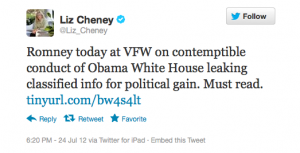Ah, But Are You Like George W. Bush?
I’ve been in an car dealer service waiting room all morning, so I’m late to the story about Barack Obama telling Jello Jay Rockefeller he’s not as bad as Dick Cheney.
Sen. Jay Rockefeller (D-W.Va.) confronted the president over the administration’s refusal for two years to show congressional intelligence committees Justice Department Office of Legal Counsel memos justifying the use of lethal force against American terror suspects abroad.
[snip]
In response to Rockefeller’s critique, Obama said he’s not involved in drafting such memos, the senators told POLITICO. He also tried to assure his former colleagues that his administration is more open to oversight than that of President George W. Bush, whom many Democratic senators attacked for secrecy and for expanding executive power in the national security realm.
“This is not Dick Cheney we’re talking about here,” he said, according to Democratic senators who asked not to be named discussing the private meeting.
Aside from the fact that — as I’ve pointed out — Obama is actually worse than the last year of the Bush Administration, when Acting OLC head Steven Bradbury was sharing OLC memos with Congress, I’m struck that Obama seems to forget he is the President, not the Vice President.
The comparison still is inapt. George Bush didn’t write any Executive Orders pretending to be transparent and his classification Executive Order effective empowered Dick Cheney to classify and instadeclassify at will (an authority that John Brennan seemed to use while he was in the White House).
But like Bush, Obama has people working for him who are as allergic to oversight as Dick Cheney. I pointed out yesterday, for example, that Obama’s Director of National Intelligence, James Clapper, thinks he shouldn’t even answer questions in open session and tried to stop publishing the number of people with security clearances.
Under Bush, DOD hid pictures of coffins; under Obama DOD just started hiding numbers of drone strikes.
Cheney went to the mat to hide who he had met with on his Energy Task Force. Obama’s National Security Council went to the mat to hide any mention that the President had authorized the torture program — and they hid it, they explained, because they were still using that very same authorization (though to do thinks like engage in targeted killings).
Obama seems to be hiding behind his own stated good intention (even while he admitted to Democratic Senators he would feel the way they do now if he were still in the Senate) just like Bush hid by his stated good intention that no one would leak the name of a CIA officer. Both, meanwhile, were either ignoring or pretending to ignore the sheer paranoia about secrecy of the men that work for them.


